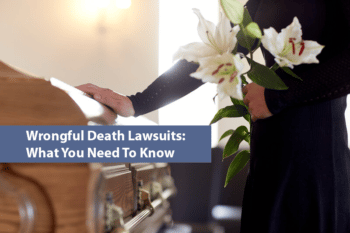What Is A Wrongful Death Lawsuit?

You may have heard the term “wrongful death” before. In many ways, it seems self-explanatory. However, in legal terms, a wrongful death lawsuit can be brought in Civil Court (different from criminal court) against a company or individual when that company or individual (the defendant) has negligently or intentionally caused someone’s death. In Ohio, wrongful death litigation is provided for in Ohio Revised Code Chapter 2125.
To meet the standard for wrongful death, the cause of death must have been due to negligence or intentional actions of that defendant. Wrongful death lawsuits are typically filed when the victim would have otherwise had a valid personal injury suit due to the actions of the defendant if he or she had survived. For example, if someone is killed in a car accident by a negligent driver, their estate would have a valid wrongful death claim.
Grieving families are often left with many questions after the death of a loved one and many seek out an attorney to help them find answers, especially in the context of medical and nursing home cases. Wrongful death lawsuits are filed on behalf of the victim by a representative of the deceased’s estate and surviving family members affected by the death (the plaintiffs.) In order to prove wrongful death, the plaintiff’s legal team must show the following:
- That the defendant owed the victim a duty of care, which means that the defendant was obligated to provide reasonable care to avoid injury to other people. This can apply to actions or lack of actions regarding product safety, traffic laws, medical treatment, and many, many other areas under personal injury law.
- That there was a breach of the duty of care. The plaintiff (in this case, the decedent’s representative), must prove that the defendant did not meet the standard of reasonable care needed to prevent injury and harm to the victim.
- That the death was caused by the breach of the duty care. It is not enough to simply prove that there was a duty of care that was breached, or that a law was broken. The plaintiff must also prove that the death of the victim was a direct result of that conduct.
Some wrongful death cases do not involve negligence, and are instead tried based on intent – whether or not the defendant’s actions were done with the intent to harm or kill the victim. These kinds of acts are often also considered criminal acts and may go through a criminal trial as well. A wrongful death lawsuit in civil court may allow families of victims to seek damages against the defendant, and are subject to a lower standard of proof than criminal matters. Therefor it is wholly possible for a defendant to be acquitted of a homicide crime in criminal court, but found liable civilly for wrongful death.
In cases of wrongful death suits, the burden of proof is on the plaintiff. This means that the victim’s family and team of lawyers must prove that negligence or malicious intent was present and resulted in the death of their loved one. In many instances, a settlement may be reached before the suit ever goes to trial. However, in some situations a trial is the only way for the family to obtain justice for their loved one’s death.
It is important to remember that the statute of limitations on a wrongful death case is only two years from the date of death. Often, there are other claims in the same case that are subject to even shorter limitations periods. That is why we encourage early contact with an attorney to allow proper investigation and pursuit of all claims that may benefit the family before these time periods expire forever.
If you believe your loved one may have been a victim in a wrongful death case, please reach out to our experienced attorneys at Lowe Scott Fisher in Cleveland, OH for a complimentary legal consultation. We are here to help you get the legal recourse you deserve following the loss of a loved one.
Back To Blog